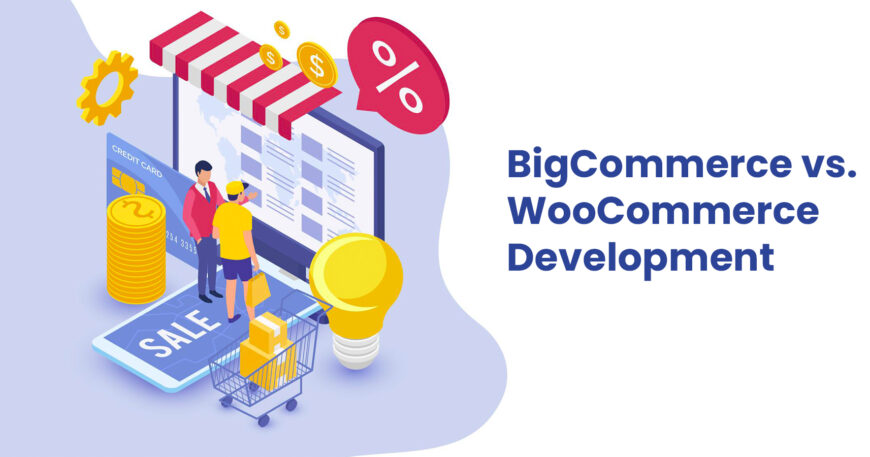The right eCommerce platform is essential for success if you’re looking to start a new online store or expand an existing one. Two of the most popular options on the market are WooCommerce and BigCommerce, each with its own advantages. BuiltWith’s eCommerce technology statistics reveal that WooCommerce is used by 24% of all websites, making it the leading platform with a remarkable 29% share of the market. In contrast, BigCommerce has only 1.45% of the market. However, BigCommerce asserts that it has been instrumental in merchants’ growth, with a 28% year-over-year increase, surpassing the industry’s average of 14%.
BigCommerce
BigCommerce is an all-in-one software-as-a-solution (SaaS) platform that provides you with everything you need to build and run an online store. This includes hosting, content management, payment processing, SEO tools, and marketing features, among many others.
WooCommerce
WooCommerce is an open source plugin that can be added to your existing WordPress site to add e-commerce functionality. This means you have full control over your online store and can customize it to meet your specific needs.
Main Differences
1. Usability
BigCommerce:
- BigCommerce is an all-in-one software-as-a-solution (SaaS) platform that provides the complete package, including hosting, content, payment, SEO, marketing tools, and many other features.
- BigCommerce has an easy signup process, and you can set up your store within minutes by providing a few details about your store’s theme, products, and customization choices.
- Regarding usability, BigCommerce has an edge, especially for those who are not tech-savvy.
WooCommerce:
- WooCommerce is a plugin for WordPress, which means you need to install WordPress, buy a domain name, and hosting account, and take care of technical issues like security, caching, and backups on your own.
- You can also choose a hosting provider like Bluehost, which offers pre-installed WooCommerce for as little as $3.95 per month.
- WooCommerce development only works with WordPress, whereas BigCommerce can easily be integrated with any content management system.
- WooCommerce has a wide range of free add-ons and plugins to create a more complex platform, but it has a learning curve and requires you to be hands-on with technology.
2. Customization
BigCommerce:
- BigCommerce offers seven free themes and 50 additional themes ranging from $145 to $245.
- BigCommerce has recently introduced a new front-end framework called Stencil, which allows you to design aesthetically pleasing storefronts without any coding knowledge.
WooCommerce:
- When it comes to design, themes, and customization, WooCommerce development provides endless options for customization.
- WooCommerce offers 14 themes for free, with an additional cost of $39 for total access.
- If you have an eye for design or want more control over how your online store looks, WooCommerce gives you more flexibility. The downside is that editing and modifying can become time-intensive, and you need to know the code to make extensive customizations.
3. Pricing
BigCommerce:
- BigCommerce offers a three-level plan starting at $29.95 per month. However, one challenge with BigCommerce’s pricing setup is that it automatically upgrades your plan when your sales exceed $50,000 and continues to charge more as you hit higher revenue tiers. This may not be suitable for businesses that prefer to have complete control over their growth scheme.
WooCommerce:
- WooCommerce is a free plugin, but costs can add up when you have to buy add-ons, an SSL certificate, and hosting services separately. Additional features and customization choices can also add to your total monthly cost.
- WooCommerce development is generally less expensive overall, but calculating your additional costs can be more complicated compared to BigCommerce’s all-in-one plans.
4. Features and Add-ons
BigCommerce:
- BigCommerce prides itself on its robust built-in features.
- It offers SSL certificates for secure payments, powerful tools for SEO, analytics, and reporting, shipping essentials, and design and marketing features.
- An abandoned cart recovery feature sends emails to customers who leave their carts without checking out.
WooCommerce:
- WooCommerce, being a WordPress plugin, offers access to over 55,000 free plugins in addition to its own 250 free plugins, allowing for infinite customization possibilities.
- WooCommerce does not offer a complete package of features and relies on third-party plugins for some functionalities, which can be a double-edged sword.
- WooCommerce development provides a wide range of options, but it also means that you need to manage and maintain multiple plugins, which can be overwhelming.
5. Help and Support
BigCommerce:
When it comes to help and support, BigCommerce has the upper hand. It offers 24/7 assistance via phone, email, and live chat and has a comprehensive help center with guides to help you manage your site effectively.
WooCommerce:
WooCommerce development provides little to no support services, and users are mostly left to their own devices. Although WooCommerce does have a help center with technical documents, it may not be as comprehensive as BigCommerce and requires users to be more tech-savvy to troubleshoot any issues.
6. Security
In the era of privacy concerns and data breaches, security has become a top priority for e-commerce platforms.
BigCommerce:
- BigCommerce ensures that your site remains PCI compliant, protecting sensitive information.
WooCommerce:
- WooCommerce development provides security add-ons, but the responsibility of keeping the site PCI compliant lies with the user, as neither WooCommerce nor WordPress take care of it.
- WooCommerce may be more prone to security vulnerabilities due to the nature of hosting third-party apps and WordPress plugins.
7. Scalability
As your online store grows with more products, customers, and inventories, scalability becomes crucial to ensure smooth functioning and productivity.
BigCommerce:
- BigCommerce, being a fully-hosted platform, offers hassle-free scalability with fast page load times and the ability to handle 500,000 hits per minute.
- BigCommerce provides a smoother workflow and is better equipped to handle larger delivery networks, making it a more favorable option for growing B2B businesses that require multiple users with the same account, custom pricing, large catalogs, draft orders, and powerful SEO capabilities.
WooCommerce:
- WooCommerce development offers great customization abilities, and businesses using the platform have listed over a hundred thousand products. However, the addition of numerous features and plugins can create a more complex structure, leading to issues such as blocked site traffic, slower load times, and poor site optimization, all of which result in slower performance.
8. Multi Store Setup
BigCommerce:
- BigCommerce offers a powerful WordPress plugin that allows you to manage multiple stores worldwide with a single control platform. You don’t need any iframes or javascript knowledge for this, making it easy to set up.
- BigCommerce provides streamlined global shipping and supports major global carriers. It even allows you to sell across multiple platforms like Amazon and Facebook.
WooCommerce:
- WooCommerce may not match BigCommerce in scale, but it now offers a way to build a multilingual online store. It has additional translation services that you can add on as another plugin.
Choosing the Right Platform for Your E-commerce Business
Both WooCommerce and BigCommerce offer powerful tools for e-commerce development, but they have different strengths.
If you are comfortable with technology, need maximum flexibility in terms of design control and add-ons, and want to choose your own hosting service, WooCommerce may be the way to go. WooCommerce development is also a more cost-effective option compared to BigCommerce, making it suitable for small to medium-sized businesses on a budget.
On the other hand, if you are in search of a more hands-off approach and want a platform that takes care of back-end logistics for a larger business, BigCommerce may be an easier solution. With its efficient multi-store setup capabilities, built-in security features, and fast delivery network, BigCommerce can handle the complexities of managing multiple stores in different locations.
Conclusion
In conclusion, managing multiple stores in different locations requires a reliable and efficient e-commerce platform. Both WooCommerce and BigCommerce offer powerful tools for e-commerce development, but they have different strengths. WooCommerce development is a more flexible and cost-effective option, while BigCommerce offers efficient multi-store setup capabilities for larger businesses.
In this blog post, we draw inspiration from the insightful video comparing BigCommerce and WooCommerce to provide you with valuable insights and guidance in choosing the perfect eCommerce platform for your unique needs.
Whether you choose WooCommerce or BigCommerce, having experienced WooCommerce developers and BigCommerce experts from Vserveecommerce can help you make the most of the platform and ensure smooth operations for your online stores.





